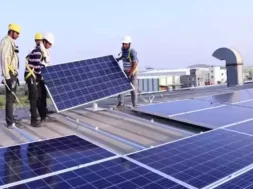
At the G20, India is pressing the issue of energy storage – EQ Mag
At the G20, India is pressing the issue of energy storage
India hosted its first Energy Transition Working Group (ETWG ) meeting from February 5th to 7th, 2023. The meeting took place at the IT Hub of India, Bengaluru. Union Minister of Power and New & Renewable Energy R K Singh addressed the meeting and highlighted various issues pertaining to the global energy sector. During the course of the meeting, the delegates participated in various sessions like Energy Transition through addressing technology gaps, Low-cost Financing for Energy Transition, and Fuels for Future among others.
The G20 Energy Transition Working Group’s (ETWG) discussions and conclusions could perhaps offer a solution to this ongoing energy crisis because energy is one of the main flashpoints in the world. During his address at the ETWG meeting, Union Minister R K Singh during his address highlighted issues regarding energy transition, energy security, and energy availability.
Furthermore, talking about energy transition, we also need to consider energy storage because having a suitable storage facility is essential for the success of the idea of transitioning to renewable energy. As highlighted by the Minister, if we don’t have round-the-clock renewable energy then any talk of completely transitioning to renewables can be termed as imagination because you need energy when the sun doesn’t shine, you need energy when the wind doesn’t blow and for that you need storage. Moreover, the Minister during his speech addressed several challenges pertaining to renewable sources of energy.
Where does India stand?
India has made great progress in its transformation from a country that relied heavily on coal to a potential leader in the renewable source of energy. As per the latest data published by the Ministry of New and Renewable Energy India stands at 4th position in the world in terms of installed Renewable Energy capacity.
Schemes like PM-KUSUM which aims to provide financial and water security to farmers through harnessing solar energy or National Smart Grid Mission (NSGM) are key initiatives of the government. Governments flagship initiative, the Green Energy Corridor (GEC) which aims at synchronizing electricity produced from renewable resources, such as wind and solar, with the conventional power stations in the grid is yet another step in that direction. According to the data published by Ministry of New and Renewable Energy, as of 31.12.2021, works related to the installation of transmission towers and their stringing for an aggregate of approx. 8468 ckm have been completed, and substations of aggregate capacity of approx. 15268 MVA have been charged.
India has consistently backed the switch to renewable energy sources, and one of its initiatives in this direction is the International Solar Alliance. Recently, New Zealand’s Foreign Minister Nanaia Mahuta during her visit to India handed over the signed copies of the International Solar Alliance (ISA) Framework Agreement paving the way for New Zealand’s membership of this initiative.
India has done a number of actions toward energy storage. Further, Solar Energy Corporation of India (SECI) issued tender for 1000 MWh Battery Energy Storage System (BESS) in October 2021 to enable DISCOMS to use storage facilities on an on-demand basis. BESS, one of the most important emerging technologies in the Indian renewable energy market, can provide both peak-time power supply and 24-hour electricity to help overcome renewable energy’s unsteady nature.
In addition, International Energy Agency’s India Energy Outlook 2021 also projected that India could potentially have 140-200 gigawatt (GW) battery storage capacity, the largest for any country, by 2040.
















